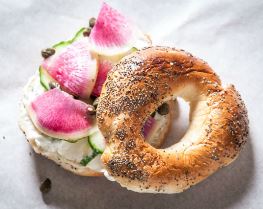
Featured Item

Feeding frum families on a budget
GILLIAN KLAWANSKY
“It is possible to keep costs down even when you’re keeping a kosher home,” says Adrienne Bogatie. As the owner and blogger of Kashering Your Life, Bogatie helps families manage their grocery expenditure.
“Not only kosher people are struggling, everyone is,” she says. “But my budget for kosher families is slightly higher than for non-kosher ones.
“Including toiletries, I budget a maximum grocery spend of R2 500 to R3 000 per person per month for kosher families. But, you can get away with R1 200 per person if you’re really frugal or getting assistance.”
Personally overseeing the food costs of a strictly kosher family of seven – her husband, herself, and five children – Bogatie is all too familiar with the costs of kosher living.
“About 15 years ago, we just weren’t making ends meet,” she recalls. “The business my husband was in went insolvent, I was pregnant, and we had no money. It started from there – just having to make do. I learned to make soup from the peels of the vegetables I was serving.”
Bogatie began following American blogs about bargain hunting, but struggled to find information that applied to the South African market. “So I started looking at coupons available in South Africa,” she says. “If you know how to use loyalty points, apps, and online shopping, you can reduce your budget hugely.”
She recommends two apps, SMARTnSAVE, which allows you to get cash back on your till slips at all major retailers, and Wuhu Deals, which offers mobile coupons and rewards. “You can use these apps in conjunction with rewards programmes specific to particular stores,” she says.
Bogatie also advocates envelope budgeting. “Once your big bills are covered, only use cash – put cards away. You draw a certain amount of cash every month, and put it into different envelopes to cover different costs. That way there’s no impulse buying because you can’t.”
“Buying in bulk in South Africa is not always cheaper,” she says. “The South African pricing market seems to trend more towards the popularity of a product. For example, in terms of sugar, 2.5kg is actually cheaper per kilogram than a 5kg pack.”
If you’re buying fruit and vegetables in bulk where you can sometimes save, make sure you use everything before it goes bad, otherwise consider splitting purchases with friends or family.
“Black Friday is also a big thing,” she says. “This is when I take my three eldest kids, and we all buy dry goods in bulk.”
When going shopping, Bogatie stresses the importance of timing and of sticking to a shopping list. “The worst time to go is when you’re in a hurry or feeling hungry because you buy on impulse, and that costs a lot extra.
“Don’t drive around too much either, go somewhere where they have most of your stores, both for convenience and to save on petrol. Going into a store costs a fortune. It’s much cheaper to shop online..”
Meal planning also cuts your budget, she says. You’re able to narrow down your shopping list, and even plan meals around specials. “Also, remember that toiletries are standard, so it pays to buy from places that offer discounts.”
Bogatie is skilled at making meals go further. “Fill your kids up on food that goes a long way by using low GI foods. Mash beans and lentils into food so fussy kids can’t see them, and you’ll bulk food up with healthier options that keep them fuller for longer.
“Look at foods that aren’t high in sugar, as sugary foods make kids hungrier, earlier. It’s about using less to make more. We drink only water at the dinner table, which is also healthier, and my kids know that cold drinks and treats are apportioned on Shabbos.”
Also strictly kosher, Dinah Unterslak has always been money conscious. Now that she and her husband have five kids aged between three and 14, her saving savvy is more vital than ever.
“I shop by special,” she says. “I’m a huge bargain hunter, so I buy top non-perishable brands in bulk when they’re on special, regardless of whether it’s at a store I usually go to. Our kids aren’t in nappies anymore, but you can get a R50 to R60 discrepancy on nappies, so you really have to find specials there.”
Unterslak also loves rewards programmes. “For example, at the end of the month, I’ll have about R350 on my Dis-Chem points.”
And, she is proactive about cutting costs. “I created a WhatsApp price busters group. There are probably more than 100 women on it who just post specials. There’s 100 eyes and ears on everything from a special at Food Lover’s Market to a Lou Harvey sale.”
Unterslak also advocates meal planning and minimal shopping sprees. “I try do a big monthly shop, and then I place a six-week meat order for dinners from Monday to Thursday. I’ve got three freezers,” she laughs.
“We also keep Chalav Yisrael, which is an additional cost. On Sundays, I do a Woolworths shop. That’s my one weakness in terms of spending on fruit and vegetables.”
Unterslak also hosts Shabbos meals almost every week. “Yomtov and Shabbos entertaining is massively expensive, it’s a different animal,” she says. “Just a roast is R250, and that’s just a brisket. I’ll buy a brisket as opposed to a flap though, and you can buy a reasonable whole frozen chicken as opposed to buying braai packs. I find that fish is just as expensive as meat.”
Aside from kosher grocery bills, big families also have to contend with the costs of private school fees for multiple children. “School is stiflingly expensive,” says Unterslak.
“Jewish schools are very open to subsidies if you can’t afford it, though. On top of that, you need basic medical aid. So, before you start the month, you’re on R40 000!” she says.
“That’s why I’m such a big bargain hunter.”




